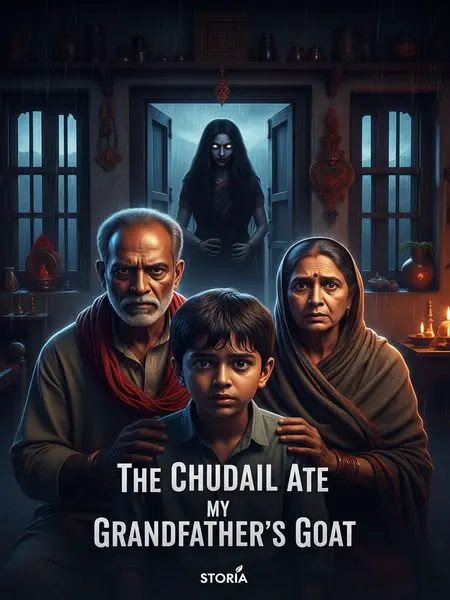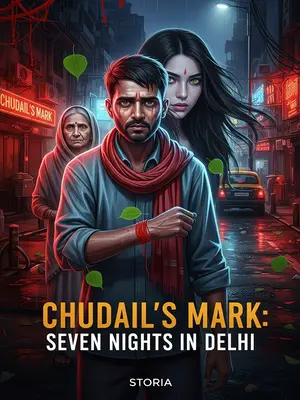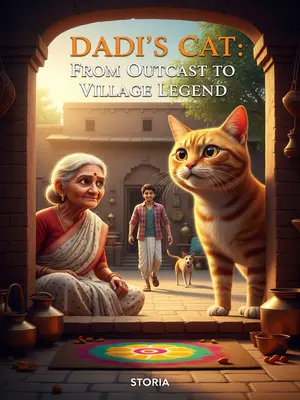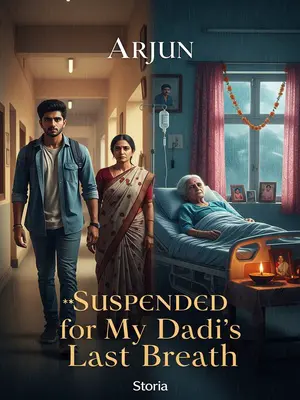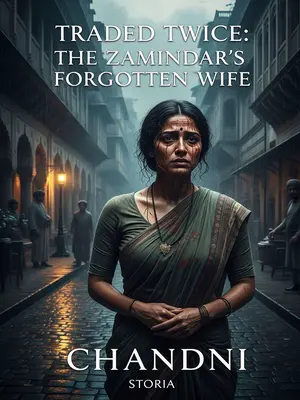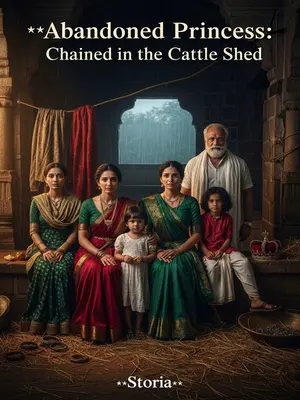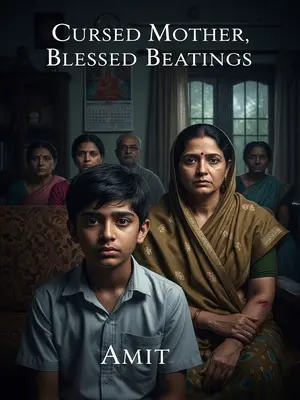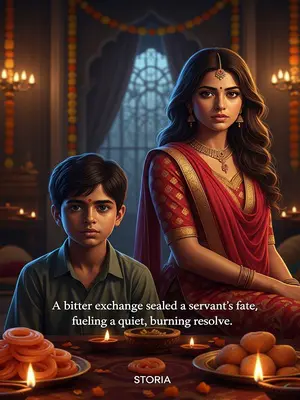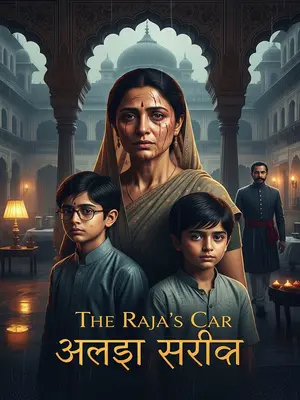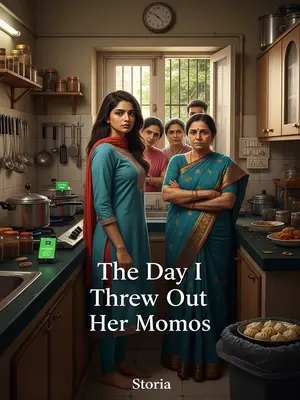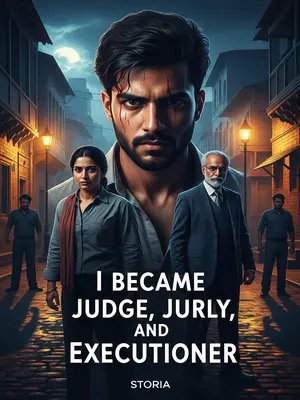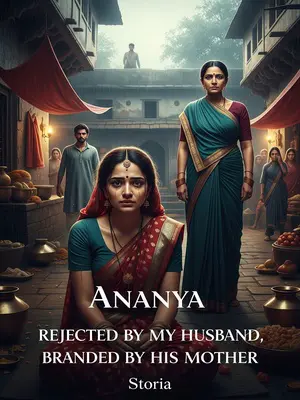Chapter 2: The Hungry Guest
As soon as Dadaji spoke, I heard footsteps crunching in the snow at the gate.
The iron gate creaked, and the wind carried the sound right to us. My heart hammered, almost louder than the footfalls themselves.
By moonlight, a woman entered the yard. Her faded saree clung to her thin frame, silver anklets jingling eerily. She wore no shawl, even in the biting cold. The moon made her skin almost see-through, her shadow thin and wavering on the snow.
Her face was ghostly pale, eyes bloodshot and wild. If not for her shadow, I’d have thought she was a chudail. The air felt thick with unsaid things, as if all of us were holding our breath. Goosebumps prickled my arms—Dadi’s stories of chudails and bhoots from blackout nights flashed in my head.
Dadi was startled, but tried to sound gentle. "Beta, itni raat ko—why have you come?"
She spoke like to a lost child, one hand clutching her mangalsutra, the other raised in a hesitant welcome.
The woman replied, voice trembling, "Aunty, road snow se band hai. I got separated from my husband. Saw a light on the hill, came here. Do din se kuch nahi khaya. I’m so hungry."
Her words faltered, and the longing in her eyes was more than just for food. The syllables hung heavy in the cold air. Dadi’s eyes narrowed, as if searching her soul.
When she said, "I’m so hungry," her eyes bulged, blood vessels red as if ready to burst—like a chudail hungry for prasad on Amavasya.
The silence was suffocating, broken only by the tube light’s faint buzz and the wind’s whine. My mouth went dry; I clung to Dadi’s shawl, hiding behind her.
I pressed my face into the wool, breathing in goat and smoke, wishing I could disappear. My heart beat so loud, I was sure the woman could hear.
She forced a smile, stepped closer, and said, "Aunty, I want cooked mutton. Do you have any?"
Her voice was both pleading and warning. Her eyes flashed, and I shrank further, wishing I could vanish into the dark.
Her tone was half threat, half plea. It felt like, if she couldn’t have mutton, she’d eat us instead.
The words slithered through the cold, chilling me to my bones. Even Dadi’s face paled, her glance flicking to Dadaji, searching for comfort she didn’t find.
Dadi froze for a moment, as still as a temple idol. Her lips moved in silent prayer, fingers fidgeting with her mangalsutra beads. The steel basin in her hand rattled against the threshold.
Seeing the woman about to approach, Dadaji said coldly, "Mutton handi mein hai."
His voice was flat, as if talking to a neighbour instead of a spirit. He didn’t blink, just stared at her like two animals sizing each other up.
He brought out half a basin of steaming mutton, the scent curling in the night. The woman’s nostrils flared, lips twitching. She looked wild, almost animal.
She grinned, "Uncle, half basin is nothing. I haven’t eaten in two days."
Her tongue flickered, and for a second, I thought it was forked. The hunger in her eyes was terrifying.
Dadaji shot her a look. "Bas yahi hai."
He set the basin down, the clang echoing. The woman knelt, grabbed the meat, and started eating with her hands, tearing at it like a starving street dog.
She crunched the bones, swallowing the bigger ones whole. The sound was sickening—wet crunches and dull thuds. I wanted to look away but couldn’t.
Dadi pulled Dadaji aside, whispering, "Buddhe, woh ladki insaan nahi hai. Bhoot lag rahi hai—bhookhi aatma."
Her words barely rose above the wind, but fear made them sharp. She gripped his sleeve, hoping for comfort, but his face was unmoved.
Suddenly, the woman froze, staring at Dadi with a sinister grin. Her mouth was pitch black—a gaping hole with no teeth at all.
For a second, the yard was utterly still—even the snowflakes seemed to pause. The woman’s grin stretched impossibly wide, darkness yawning where her teeth should be.
Dadi turned away, hands pressed together, whispering prayers to Hanumanji, clutching her shawl tight. Her whole body trembled, anger replaced by pure terror.
Dadaji took two puffs of his bidi and said, "Budhiya, ja west room saaf kar. Priya ko wahin sula do."
His tone was calm, but each word sliced through the night. The use of a name made the woman’s presence real—and more frightening.
Dadi was stunned. "Priya kaun hai?"
Her brows knotted, the name sour on her tongue.
Dadaji pointed at the woman, voice growing impatient. "Jaldi kar, west room taiyar kar."
His eyes burned, and even the woman seemed to flinch.
Dadi snapped, "Tum jaante ho isko?"
She stepped back, voice rising, the cold air shivering with her disbelief.
Dadaji’s temper flared, and he shoved her, barking, "Jao!"
She stumbled, catching herself on the doorframe. The house echoed with the sound of their fight, as if the old walls were listening too.
At that moment, the woman let out a ghostly, high-pitched laugh. She’d finished the mutton and was licking the steel basin with her long, forked tongue.
Dadi spat a curse, her voice shaking with disgust and fear.
"Main nahi jaungi. Safai karni hai toh khud karo," she shot back, fists clenched, standing her ground—though her voice trembled.
She tried to lead me to the east room, but Dadaji blocked her, his voice menacing: "West room saaf kar, abhi!"
His shadow loomed over us, and for a moment, I thought he might actually strike her. Dadi’s spirit broke; she grabbed my hand, squeezed, then let go, defeated.
She didn’t dare defy him further, muttering curses into her shawl as she vanished into the darkness of the west room.
Soon, she reemerged, cursing, "Lal Chand, tu toh musibat bulata hai!"
Her voice rang down the hall, eyes blazing with anger but hands shaking. The storm inside her was plain to see.
The woman grinned, sidling up to Dadi. "Aunty, Lal Chand pagal hai. Maar do usko. Kaam ka nahi hai."
Her words slithered through the air, poisonous and sly. She smiled, eyes twinkling with mischief. The suggestion lingered like incense smoke.
At some point, she’d produced a sharp kitchen knife, handing it to Dadi. The blade glinted, familiar but dangerous. Dadi took it, hands trembling, old resentments heavy in her grip.
Dadi glared at Dadaji, hatred flaring in her eyes, knuckles whitening on the knife.
The woman laughed again, circling Dadi, chanting, "Maar do... maar do. Aisa aadmi toh pareshani hai."
Her laugh echoed, sending chills up my spine. Dadi’s heart pounded so loud, I could hear it. The woman’s words hung in the air, thick as temple incense.
Her eyes glowed red, voice growing sharper, the room turning icy.
Dadaji’s face was dark. "West room ready hai. Ek raat ruk jao, subah nikal jana."
His words were final, like a panchayat order. The woman glared, then melted into the west room shadows.
With her gone, the air eased a bit, but her presence lingered. Dadi’s grip loosened, the knife clattering to the floor.
She stared at it, hands shaking, as if seeing it for the first time.
"Yeh kya ho raha hai?" she whispered, lost, palms pressed in prayer, forehead creased with worry.
Before she could finish, Dadaji said, "Andar aao, baat karte hain."
He gestured us into the main room, the doors creaking, firelight giving a little warmth.
We all went in. Dadaji closed the door, whispering, "Aaj raat, west room waali aurat teen baar knock karegi. Pehli baar, woh Arjun ko bulayegi—usko paani bharne ko bolegi..."
His voice was a whisper, but each word hit like a drumbeat. Dadi slumped onto the charpai, fear heavy in the air.
Before he could finish, Dadi burst in, "Nahi! Arjun bahar nahi jayega! Kaun hai woh aurat? Kya chahiye usko? Hatao usko, burai hai woh!"
Her voice broke, tears welling. She clutched at Dadaji, pleading.
Dadaji took a deep breath. "Zinda rehna hai toh meri baat maan lo."
He looked at her with that old, stony resolve. Dadi wiped her eyes, but the fear stayed.
He turned to me. "Arjun, agar woh aurat paani mangti hai, drum bhar dena. Kuch bhi dekho ya suno, awaaz mat nikalna. Teen bucket lagega. Teen baar bhar ke seedha wapas aajana. Woh kuch bhi bole, rukna mat. Samjha?"
His words pressed down like a heavy blanket. I nodded, heart racing. Dadi clutched my arm, nails digging in.
"Samajh gaya," I managed, voice trembling. Dadi’s lips moved in silent prayer.
Just then—three knocks echoed at the door. Slow, deliberate, unnatural. Dadi froze, hand clamped over her mouth.
Outside, the woman’s eerie voice curled through the cracks: "Uncle, paani khatam ho gaya. Arjun se drum bharwa do."
Her words seeped into the room, prickling my skin.
Dadi’s face changed. She hugged me tight, voice breaking: "Nahi! Arjun nahi jayega! Main nahi bhejungi!"
She buried my face in her shawl, desperate to keep the darkness out.
Dadaji frowned, "Chhod do. Agar Arjun nahi gaya, toh woh tod ke aa jayegi. Phir hum sab gaye."
His words were final, terrifying. For the first time, I understood this was bigger than a scary story.
Dadi sobbed, cursing, "Pagal buddhe! Arjun hamara pota hai! Woh aurat burai hai, tum usko marne bhej rahe ho? Dimag kharab ho gaya hai kya?"
Her voice cracked, tears streaming as she rocked me in her arms.
The woman’s voice sharpened outside. "Uncle, paani chahiye! Arjun se paani mangwao!"
The walls seemed to shrink, the lamp flickering.
Dadaji, stronger, pried me from Dadi’s grip. "Arjun, yaad rakh. Jo bola woh kar. Ja."
He lifted me, his grip firm but not cruel. Dadi wailed, clutching empty air.
He opened the east room door and pushed me out into the night.
The cold slapped my face, air sharp as knives. The world outside was huge and empty, snow crunching under my feet.
It was freezing. The woman’s hand gripped my neck, breath icy as she crouched beside me. "Arjun, kitne saal ka hai tu?"
Her breath chilled my cheek. I flinched, her eyes hungry, gleaming in the darkness. The stench of goat was overpowering.
When I looked at her, her pupils were horizontal—like the old goat’s—locked on mine. For a moment, my feet refused to move. I remembered Dadi’s story about the bhoot who tricked children with sweets, and my feet turned to stone.
